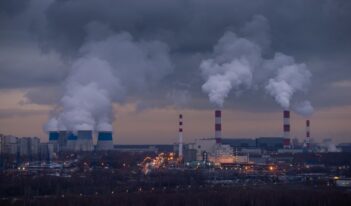
Society should pursue bottom-up, market-based approaches to address climate change.
Today, bottom-up, market-based approaches seem more feasible and effective in mitigating the climate problem, especially when prices reflect supply and demand conditions. These approaches include adaptation based on the pricing mechanism and the provision of “clean products” by companies at the demand of consumers and investors. So far, these strategies have largely taken a back seat in public discourse over greenhouse gas (GHG) mitigation efforts.
Reshaping the energy sector for the sole purpose of aggressively combating climate change poses a societal risk. Prematurely phasing-out fossil fuels, for example, likely would inflict a large cost on energy consumers. Those who advocate less or no fossil-fuel use generally skew their finding by imputing little if any weight to the economic effect.
The Nobel laureate Ronald Coase once coined the term “blackboard economics.” This term is especially instructive for different climate actions, such as a carbon tax, that may appear to be the right action at first, but with further consideration, are less attractive. Because of politics, for example, it is likely that the tax level would correspond closer to the wishes of special interest groups with the most political clout. Politics would also make it implausible that command-and-control regulations and other inefficient policies would be discontinued, seriously diluting the benefits that economists have ascribed to a carbon tax.
It is not hard to find examples where actual public policies in all areas of society—for example, the pricing of utility services, central planning of economic activity, assistance to low-income households, control of air pollutants—deviate far from what “blackboard economics” would say is optimal. Such a suboptimal outcome typically results from information deficiency—for example, what economical clean-energy technologies will appear on the market over the next several decades—and the government’s incentive to appease special interests rather than the public good.
Climate policy certainly falls into that space where government failure becomes almost inevitable. There exists a “pretense of knowledge” where policymakers are under the illusion that they can predict the long-term future with reasonable accuracy and alone can solve problems outside the marketplace.
Some analysts consider climate change a “wicked problem” that requires significant global efforts to reduce GHG emissions. But addressing climate change on a worldwide scale by substantially reducing GHG emissions would be extremely costly, politically infeasible, and virtually impossible. Even if one accepts the scientific fact that climate change is occurring, human activities are not the sole factor of that change, and the damaging effects on society are potentially catastrophic but highly uncertain. Climate change is unequivocally a complex issue that has confounded experts and policymakers.
One worry is that the motivation for aggressive action—what some academics label as deep decarbonization with the hurried phase-out of fossil fuels—might derive from rent-seeking. Rent-seeking occurs when individuals attempt to acquire benefits for themselves through political forces. These actions would tend to concentrate the benefits to these special interest groups even though they spread the costs to the general population. A good example might be interest groups pressuring state utility regulators to promote, through subsidies, energy efficiency, distributed generation, electric vehicles, and other clean-energy technologies
Subsidization is unfair to both utility customers and competing third-party providers. Unfortunately, some evidence suggests that an increasing number of states and localities have been at the forefront of bad policies that have increased electricity prices, consequently inflicting a regressive-tax-type burden on lower-income people.
Government can play a vital role by funding basic research and development that spawns new technologies or improvements of current ones that reduce abatement costs. This outcome could help to soften the clash between climate-stabilization and economic-growth goals, for example, by making the use renewable energy economical instead of fossil-fuel for electricity generation in the absence of subsidies.
A common perception is that, because the atmosphere is a global shared resource, any climate policy should require government-driven, worldwide collective action. Since any change in GHG emissions originating at the local level affects the entire world, any successful coordination would require virtual unanimity rather than just coalition-building. But, as past experience has shown, reaching mutual consent of multiple heterogenous countries is a herculean act.
These realities warrant a refocusing of climate efforts toward a bottom-up approach. Specifically, policymakers should emphasize more the role of markets in addressing climate change. Yet the presumption is that because producers and consumers fail to account for the social cost of GHG emissions in their decisions, a market failure exists that can be correctable only by non-market intervention—namely, the government.
But markets are more flexible than government in adapting to changing and unexpected developments. Governmental actions often reflect decisions based on static information. These actions tend to remain immutable even as the government accumulates new information, while market and other conditions vary.
Indeed, markets have an incentive to accommodate their actions to a dynamic environment. This incentive diminishes the likelihood of costly mistakes that government often makes in its central-planning endeavors. Especially for climate change where massive uncertainties prevail, flexibility and adaptability are key factors for sound decision-making.




